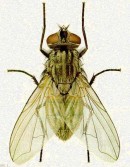 If science fiction, which has gotten some play around here today, often requires thinking big — about the unknowable future, about human nature, about the broad consequences of catastrophe — then what’s the opposite of that? I submit that it may be writing about flies. Not giant, humanity-enslaving flies that have hatched from someone’s sinister lab (that must be the plot of some book, right?) but just, you know, flies. Here are two passages, from two great books — Hunger by Knut Hamsun and Zeno’s Conscience by Italo Svevo. Both excerpts involve writers who are distracted by the pests and end up closely (and beautifully and humorously) observing them. Hamsun first:
If science fiction, which has gotten some play around here today, often requires thinking big — about the unknowable future, about human nature, about the broad consequences of catastrophe — then what’s the opposite of that? I submit that it may be writing about flies. Not giant, humanity-enslaving flies that have hatched from someone’s sinister lab (that must be the plot of some book, right?) but just, you know, flies. Here are two passages, from two great books — Hunger by Knut Hamsun and Zeno’s Conscience by Italo Svevo. Both excerpts involve writers who are distracted by the pests and end up closely (and beautifully and humorously) observing them. Hamsun first:
However, I was unable to write. After a couple of lines, nothing more wanted to come; my thoughts were elsewhere and I couldn’t pull myself up to the effort. Everything around bothered me and distracted me; everything I saw obsessed me. Some flies and gnats were sitting on my paper and this disturbed me; I breathed on them to make them go, then blew harder and harder, but it did no good. The tiny beasts lowered their behinds, made themselves heavy, and struggled against the wind until their thin legs were bent. They were absolutely not going to leave the place. They would always find something to get hold of, bracing their heels against a comma or an unevenness in the paper, and they intended to stay exactly where they were until they themselves decided it was the right time to go.
And now Svevo:
Late one night I had come home and, rather than go to bed, I had entered my little study and turned on the gas. In the light a fly began to torment me. I managed to give it a tap — a light one, however, to avoid soiling my hand. I forgot about it, but then I saw it in the center of the table as it was coming to. It was motionless, erect, and it seemed taller than before, because one of its little legs was paralyzed and couldn’t bend. With its two hind legs it assiduously smoothed its wings. It tried to move, but turned over on its back. It righted itself and stubbornly resumed its assiduous task.
I then wrote those verses, amazed at having discovered that the little organism, filled with such pain, was inspired in its immense effort by two errors: first of all, by the stubborn smoothing of its wings, which were unharmed, the insect revealed that it didn’t know which organ was the source of its pain, and in the determination of that effort it revealed that its minuscule mind contained a fundamental belief that good health is the birthright of all and must surely return when it abandons us. These were errors that can easily be excused in an insect, which lives only a single season and hasn’t time to accumulate experience.

